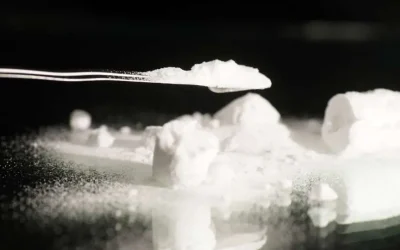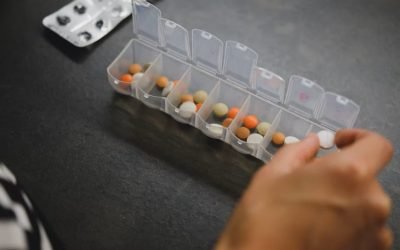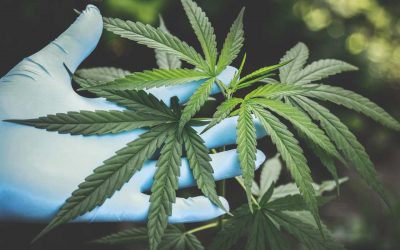Last updated: October, 2025
Cocaine addiction can develop faster than most people realise. For many, it begins as a way to boost confidence, relieve stress, or enhance performance. Over time, however, occasional use can turn into dependence, and stopping becomes extremely difficult without support.
Cocaine has long been associated with success and high energy, which makes it especially common among professionals such as entrepreneurs, doctors, lawyers, and executives. But behind that image lies a cycle of euphoria, exhaustion, and emotional instability that can lead to serious mental and physical consequences.
Recognising the symptoms of cocaine withdrawal is one of the first steps toward recovery. Understanding what happens in the body and mind during detox helps prepare for the process and reduces the risk of relapse.
How Cocaine Affects the Brain
Cocaine stimulates several key neurotransmitters in the brain, especially dopamine and norepinephrine.
- Dopamine activates the brain’s reward system, creating feelings of pleasure, focus, and confidence.
- Norepinephrine triggers the body’s natural “fight or flight” response, increasing alertness, energy, and heart rate.
- Cocaine also influences serotonin, a chemical that stabilizes mood and emotional balance.
The drug prevents the reabsorption of these neurotransmitters, leading to an artificial surge in their levels. This produces the intense high and confidence boost associated with cocaine use. However, once the drug wears off, these chemicals drop sharply, leaving feelings of fatigue, anxiety, and depression.
Short-Term Effects of Cocaine
In the early stages of use, people often experience feelings of energy, clarity, and motivation. Some even report increased social confidence or sexual stimulation.
Yet even at low doses, cocaine strains the cardiovascular system. Users may experience:
- Palpitations and rapid heart rate
- Shortness of breath or hyperventilation
- Restlessness or nervousness
- Insomnia and irritability
- Loss of appetite and fatigue
With frequent use, the brain adapts to the constant dopamine stimulation, leading to tolerance. This means that higher doses are needed to achieve the same effect — and when the drug isn’t available, withdrawal symptoms begin.
What Is Cocaine Withdrawal?
Cocaine withdrawal occurs when someone who is dependent stops using or reduces their intake. The brain, which has become used to high levels of dopamine, struggles to function normally. This imbalance causes both physical and emotional symptoms that can last from days to months.
It’s important to understand that withdrawal doesn’t look the same for everyone. The severity depends on how long and how heavily someone has used, their overall health, and individual brain chemistry. Attempting to detox alone can be risky, as cravings and emotional instability increase the chance of relapse.
Short-Term Cocaine Withdrawal Symptoms
In the first days after stopping, the brain begins to rebalance its neurotransmitters. This stage can feel like an emotional rollercoaster. Common short-term withdrawal symptoms include:
- Mood swings
- Fatigue and low energy
- Depression and hopelessness
- Tremors or shaking
- Anxiety or paranoia
- Hallucinations or vivid dreams
- Increased appetite
Although these symptoms are unpleasant, they are temporary. With medical support and structure, the body and mind can begin to stabilize safely.
Long-Term Cocaine Withdrawal Symptoms
While the initial withdrawal period usually lasts a few weeks, emotional and psychological effects can persist for months. These long-term symptoms include:
- Periods of confidence followed by relapse risk
- Persistent depression or anxiety
- Difficulty concentrating
- Sleep disturbances
- Cravings for cocaine, especially in stressful situations
- Risk of replacing one addiction with another
During this stage, it’s common to experience alternating emotions: feeling strong one day and defeated the next. These fluctuations are part of the healing process but require continuous care and guidance to prevent relapse.
The Stages of Cocaine Withdrawal
Cocaine withdrawal typically unfolds in three overlapping stages:
- Crash (first few days): Extreme tiredness, irritability, and strong cravings appear as the body reacts to the absence of cocaine.
- Withdrawal phase (first 2–10 weeks): Energy begins to return, but emotional instability remains. Many people feel overconfident, believing they can manage on their own, which often leads to relapse.
- Extinction phase (up to 6 months): Depression, low motivation, and cravings can return unexpectedly. Emotional triggers or stressful events may reawaken the desire to use.
Professional supervision during these stages significantly improves the chances of a full recovery. Medical teams can help regulate mood, monitor health, and support emotional resilience.
How to Avoid Relapse
Cocaine is one of the most addictive substances, and relapse is common. However, it’s not a failure, it’s part of the process. The key is to treat it as a warning sign and seek help immediately.
If you start noticing old triggers, cravings, or mood changes, reach out to your therapist or support network. Early intervention prevents a small lapse from turning into a full relapse.
Tips for Managing Cocaine Withdrawal
Overcoming cocaine addiction takes patience and support. These steps can help you manage withdrawal more safely and effectively:
- Remind yourself why you chose to quit. Write down the physical and emotional consequences of using.
- Avoid people, places, and routines that remind you of cocaine.
- Exercise regularly to reduce anxiety and improve mood.
- Focus on nutrition and hydration to help the body recover.
- Get professional help through a rehab program that offers medical detox and therapy.
You don’t have to face withdrawal alone. At Hacienda Paradiso, our therapeutic team provides round-the-clock care in a peaceful, ecological setting. We combine medical detox with psychotherapy, mindfulness, and aftercare to help you rebuild confidence and balance.
When to Seek Help for Cocaine Withdrawal
Knowing when to reach out for help is often the difference between recovery and relapse. Many people wait until symptoms become unbearable or life begins to unravel before asking for support, but seeking help early makes the process safer and far more effective.
You should consider professional help if you experience any of the following:
- Strong cravings that make it difficult to focus or sleep
- Persistent depression, anxiety, or paranoia after quitting
- Repeated failed attempts to stop on your own
- Physical exhaustion, tremors, or irregular heartbeat
- Emotional instability or suicidal thoughts
If you recognize these signs, it’s time to speak with a qualified specialist. Cocaine withdrawal affects both body and mind, and without supervision, symptoms can quickly become overwhelming.
When Cocaine Rehab Becomes Necessary
Rehabilitation is not just for people with severe addictions. It’s for anyone who feels trapped in a cycle of use and regret, or who cannot sustain abstinence for more than a few days.
At Hacienda Paradiso, rehab begins with a medically supervised detox, ensuring that withdrawal symptoms are managed safely. Once the body stabilizes, therapy focuses on understanding the root causes of addiction: whether stress, trauma, or emotional imbalance.
Residential rehab also provides distance from daily triggers. Being away from familiar environments, social circles, or professional pressures allows the brain to heal without temptation or guilt. For many, this pause becomes the turning point toward lasting recovery.
Cocaine addiction doesn’t define who you are. It’s a condition that can be treated with the right combination of medical care, emotional support, and time. What matters most is taking that first courageous step and reaching out for help.

Taking the First Step
If you or someone you care about is struggling with cocaine withdrawal, reaching out for help is the most powerful step you can take. Recovery is possible with the right support, structure, and guidance.
FAQ — Cocaine Withdrawal and Recovery
Physical symptoms usually fade after a few weeks, but emotional and psychological effects can last for several months.
Low energy, mood swings, depression, and increased appetite are common during the first days.
It’s not recommended. Medical supervision ensures safety, reduces discomfort, and lowers the risk of relapse.
Therapy, support groups, exercise, and a structured environment are key to managing cravings.
We offer medically supervised detox, psychotherapy, and holistic therapies in a calm, natural setting designed to support long-term recovery.









